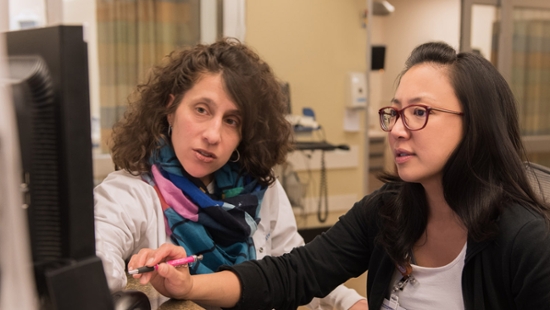The spirit of interdisciplinary collaboration that pervades Northwestern creates a dynamic and ideal environment to conduct administrative and operational research. Current projects include:
Super Track
An evolution of the emergency department split-flow model that enables rapid treatment of patients with low-complexity conditions in virtual space, reducing waiting room crowding and improving discharge length of stay, time waiting for provider and lowering walk-out rates.
Radiology Turnaround Time Reduction
Implementation of a queuing process modeled after outpatient clinic imaging within the emergency department, involving space designation and addition of assistant technologists to reduce imaging acquisition times for patients needing X-Rays. Pilot results have shown an improvement of 15 minutes avg. for imaging start times.
Physical queueing processes are also being evaluated to increase secondary CT scanner utilization, in addition to assessing development of an AI-enabled tool to assist with CT study prioritization.
Boarder Care Teams
Implemented an innovative 24/7 care team for boarding patients, operationalizing a 15 bed boarder care unit staffed by physicians and advanced practice providers cross-trained in internal and emergency medicine, complete with hospital medicine nurses.
The boarder care team has resulted in hospitalized patients starting inpatient care 1.8 hours sooner on average, contributing to an additional 8 daily admissions from the ED. Collaboration with psychiatry partners is in progress to open an additional 3 beds for care of psychiatric observation patients.
Alternative Care Pathways
A comprehensive workstream targeted at reducing inpatient hospitalizations and expediting safe, effective, and patient-centered care in the ambulatory setting. Existing alternative care pathways that have led to on reductions in admissions include:
- Low & Intermediate Risk Chest Pain pathways
- Neuro Spell pathway for patients with symptoms of TIA
- Low Risk Pulmonary Embolism pathway
- Atrial Fibrillation pathway
Additional pathways for enhanced care coordination include…
- Rapid access clinic for patients with headache
- Patients with first onset seizure
- Pregnancy of unknown location
- In development: Congestive Heart Failure and Neutropenic Fever pathways
Rapid Diagnostic Centers
Partnership with Immediate Care Centers, Primary Care and the Emergency Department to provide same-day extended diagnostic services in an outpatient setting.
Hospital At Home
Aims to reduce inpatient length of stay and an alternative to facility hospitalization by providing inpatient service to patients in the comfort of their own home.
